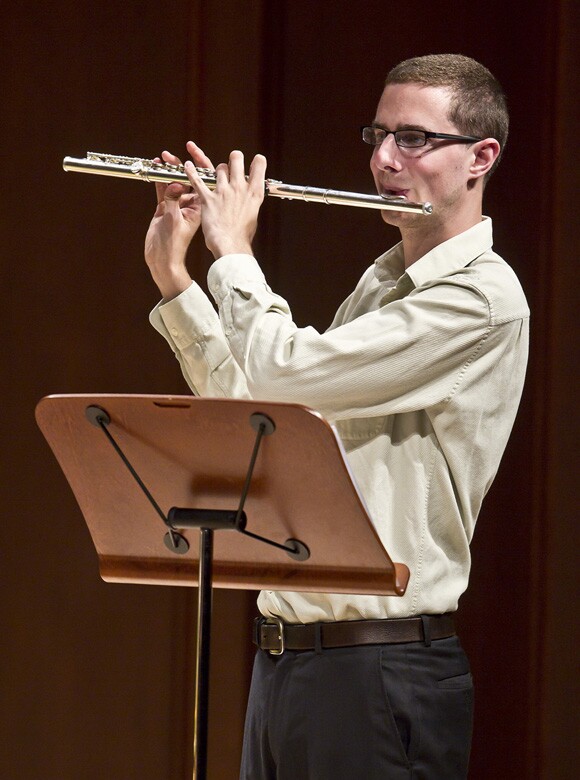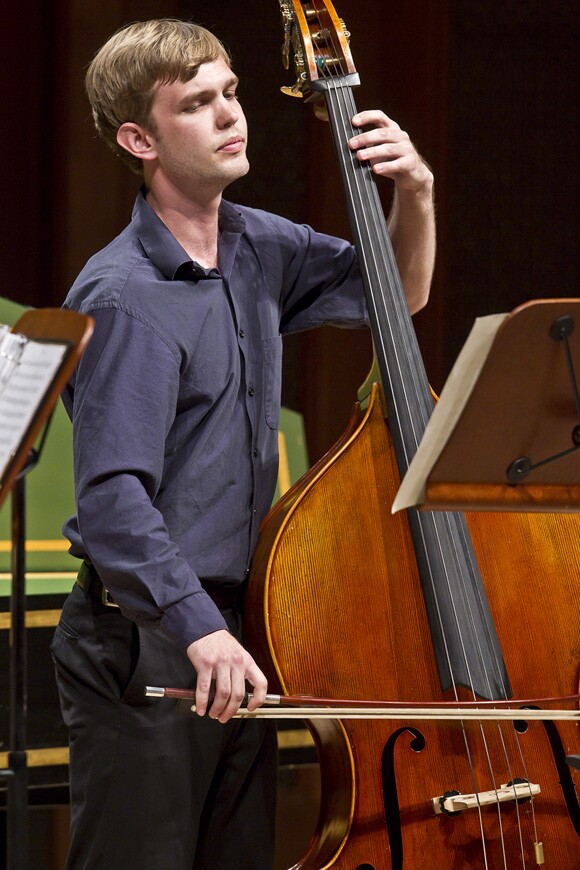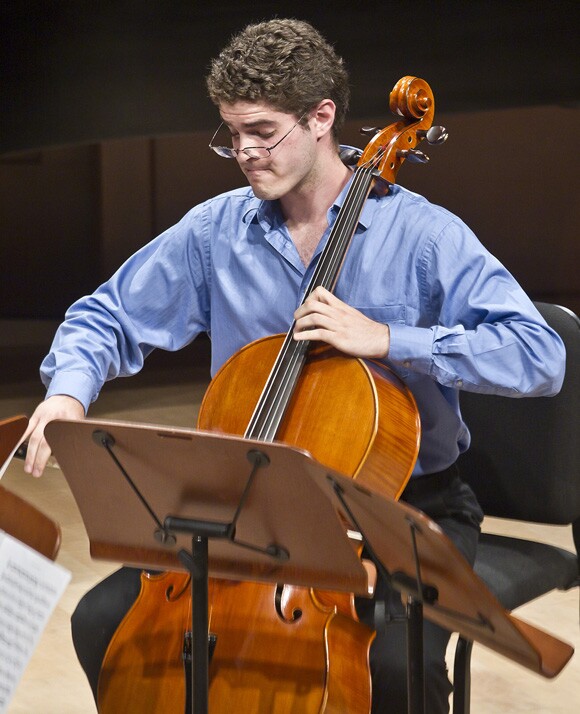Music Academy of the West: Santa Barbara's Ultimate Band Camp

Before "The Voice," "America's Got Talent," or even "American Idol," there was the Master Class, a ritual of nerve, vulnerability, and high stakes musical performance unlike any other. Typically there are just three people on stage of --one music student, one accompanist, and the master teacher. They command an audience that can range anywhere from a small handful of bassoon aficionados to several hundred often very savvy opera buffs. And the routine is generally pretty much the same: the performer has one or more pieces prepared, the signal is given, and then...well, that depends. If things are going well, the whole piece gets played all the way through, but if not, the master teacher has the prerogative to stop the pupil at any point and ask to hear a section, a transition, or even just a couple of troublesome notes, and to hear them again, and again, and again until the pupil gets them right.
Of course this nightmare scenario, in which the student doesn't even get through the first performance of a piece without interruption, is merely the stereotype, something derived more from such dramatic representations of the experience as Terrence McNally's play Master Class than from reality. It is certainly not typical of the work that takes place virtually every day during the eight week summer season of Santa Barbara's world-renownedMusic Academy of the West. This venerable institution, which celebrates its 65th anniversary this summer, offers approximately 150 master classes every year, all of which are open to the public, and many of which are free of charge.

Audiences flock to these occasions for the thrill of observing not only the development of top young talent in every discipline of contemporary classical music--from trumpet and oboe to percussion, vocals, and collaborative piano--but also for the drama of looking on while a performer is asked to make adjustments on the fly in front of a teacher who may hold their fate in his or her hands. It is, needless to say, quite a high wire act, especially when someone like soprano Marilyn Horne is in the onstage chair. Indeed, the Academy's yearly vocal competition, which is considered one of the most prestigious such awards in the world, and which takes place this summer on Saturday, July 21, is named for Horne--the Marilyn Horne Song Competition.
This is just one of the reasons that in recent years a second distinguished Academy faculty member, the pianist Warren Jones, has come to the fore, not only for his abilities as an accompanist and as a coach of collaborative piano, but also, and even primarily, for his superb work with singers. Long known for his sensitive chamber work with such professionals as Kiri Te Kanawa (a Music Academy Mosher guest artist this summer) and the Santa Barbara-based chamber music group Camerata Pacifica, Jones has developed a passionate following among master class devotees for his work with singers. His vocal master classes (there's one coming up on Friday, July 20) nearly always sell out the Academy's elegant main venue, the lavishly remodeled Hahn Hall, and last summer, Jones took to the orchestra pit where he conducted the Academy vocal program's season finale, a fully staged production of Rossini's The Barber of Seville. This year Jones will try something new on Thursday, July 26, when he will direct performances of three song cycles by Southern California composer Alan Louis Smith in a program of vocal chamber music titled Leaving Home, Seeking Home.

The opera this season, The Rake's Progress by Igor Stravinsky, will be performed twice at the historic Granada Theatre in downtown Santa Barbara with Alexander Lazarev conducting, once on Friday night, August 3 at 7:30, and then again in a matinee performance on Sunday, August 5 at 2:30. Stravinsky's English-language masterpiece imposes significant demands on the orchestra as well as the singers, and Lazarev, who has been a favorite of the Music Academy's fellows in previous years as a conductor of purely instrumental works, will be on hand for three full weeks to be sure that the production goes off without a hitch. The Academy's yearly opera, one of the highlights of musical life in Santa Barbara, typically receives reviews from such publications as the Los Angeles Times, and can launch a young singer onto the international stage.
Through a special grant from patrons Linda and Michael Keston, this and other orchestral performances taking place at the Granada can be seen for as little as ten dollars for certain seats, putting one of the world's most refined (and expensive) art forms well within reach of students and other cash-strapped members of the Santa Barbara community. And, while such outreach is certainly the primary motive for the Keston's generosity, there are significant benefits of such an arrangement for the musicians as well. Scott Reed, the dynamic young president of the Music Academy of the West, puts it this way: "giving our fellows the opportunity to perform a fully staged opera to a sold-out audience in a hall the size of the Granada (1400 seats) is exactly the kind of training experience that we can offer that they just can't get anywhere else."

Of course there is much more to the Music Academy than these vocal pyrotechnics, as even a quick glance at the schedule (available online) will reveal. Tuesday evenings at Hahn Hall are reserved for the faculty and distinguished guest artists, who put on extremely rich, varied, and instructive programs of chamber music under the rubric "Tuesdays @ 8." Most Friday evenings are devoted to the Academy's popular Picnic Concerts. At these Santa Barbara institutions, guests are invited to eat their picnic suppers in the lushly landscaped gardens of the Academy's elegant bluff top campus, a Montecito estate known as Miraflores. Local students dining on takeout sit cheek by jowl with millionaires who bring fine wines, gourmet suppers, linen napkins, china, and silverware with them in elaborate wicker baskets. After the food is put away, everyone drifts into Hahn Hall where the Academy fellows are responsible for everything, including not only the choice of music, but also the sequencing and the personnel decisions of the ensembles. These good-natured affairs offer young musicians an unprecedented opportunity to take the presentation of their talents entirely into their own hands, and the results are both surprising and delightful. The Picnic Concert experience is just one of the ways in which the Music Academy of the West distinguishes itself from all the other top summer music festivals around the world, and the spirited spontaneity demonstrated by the fellows on these Friday evenings is perhaps the single most commonly cited reason that so many audience members come back to them every summer and every week.
No really important summer music school would be complete without its share of visiting luminaries, and the Music Academy of the West is no exception. Already this summer, violinist Gil Shaham has played a recital, participated in Tuesdays @ 8, presented a master class, and given ten lucky violin students private lessons. Next week, on Wednesday, July 18, pianist Ingrid Fliter performs in recital at Hahn Hall, and the Miro Quartet will play string quartets by Mozart, Dutilleux, and Beethoven at the larger
Lobero Theater in downtown Santa Barbara on Sunday, July 22.
Everyone has their favorite visiting artist, and mine is a conductor--the irrepressible baroque specialist Nicholas McGegan, who will direct the Academy Chamber Orchestra in a program of music by Bach, Haydn, and Mendelssohn at the First Presbyterian Church in Santa Barbara on Saturday, August 4. McGegan runs the Philharmonia Baroque Orchestra out of San Francisco, and his yearly visits to the Music Academy of the West are consistently memorable. Whether he is excerpting the exciting bits from a six-hour opera by Handel, or driving the group through a propulsive period-style version of a Beethoven symphony, McGegan always seems to wring that certain something extra out of the young talent under his baton. Whether you are a visitor or a resident, taking time out from the frenzied street life of Fiesta weekend to enjoy one of these immensely satisfying concerts can feel like being transported into a different, and better, world.
Dig this story? Sign up for our newsletter to get unique arts & culture stories and videos from across Southern California in your inbox. Also, follow Artbound on Facebook, Twitter, and Youtube.